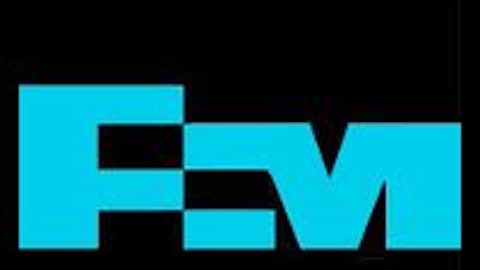![]() Banks recorded a record $42.2 billion in profits in the second quarter. As a group, they have led the broader market higher this year. The Select Sector Financial Slct Str SPDR Fd (NYSEARCA:XLF) has gained 25% year to date compared with 20% for the S&P 500.
Banks recorded a record $42.2 billion in profits in the second quarter. As a group, they have led the broader market higher this year. The Select Sector Financial Slct Str SPDR Fd (NYSEARCA:XLF) has gained 25% year to date compared with 20% for the S&P 500.
Select Sector Financial Slct Str SPDR Fd (NYSEARCA:XLF) remains below the $22 halfway point from the 2007 peak near $38 to the extreme 2009 lows near $6. Much more upside exists for this sector as the recovery continues.
JPMorgan Chase & Co. (NYSE:JPM) has gotten a lot of negative press recently, but the price action on its chart is much more positive. An upside breakout of the four-month trading range that has topped out at $56 targets a move to $62. Only a close below the $50 support level on a weekly basis would negate the bullish trend.

The $62 target is about 17% higher than recent prices, but traders who use a capital-preserving, stock substitution strategy could almost double their money on a move to that level.
One major advantage of using long call options rather than buying a stock outright is putting up much less capital to control 100 shares — that’s the power of leverage. But with all of the potential strike and expiration combinations, choosing an option can be a daunting task.
Simply put, you want to buy a high-probability option that has enough time to be right, so there are two rules traders should follow:
Rule One: Choose an option with a delta of 70 or above.
An option’s strike price is the level at which the options buyer has the right to purchase the underlying stock or ETF without any obligation to do so. (In reality, you rarely convert the option into shares, but rather simply sell back the option you bought to exit the trade for a gain or loss.)
It is important to buy options that pay off from a modest price move in the underlying stock or ETF rather than those that only make money on the infrequent price explosion. In-the-money options are more expensive, but they’re worth it, as your chances of success are mathematically superior to buying cheap, out-of-the-money options that rarely pay off.
The options Greek delta approximates the odds that an option will be in the money at expiration. It is a measurement of how well an option follows the movement in the underlying security. You can find an option’s delta using an options calculator, such as the one offered by the CBOE.
With JPMorgan Chase & Co. (NYSE:JPM) trading near $53 at the time of this writing, an in-the-money $45 strike call option currently has about $8 in real or intrinsic value. The remainder of the premium is the time value of the option. And this call option currently has a delta of about 81.
Rule Two: Buy more time until expiration than you may need — at least three to six months — for the trade to develop.
Time is an investor’s greatest asset when you have completely limited the exposure risks. Traders often do not buy enough time for the trade to achieve profitable results. Nothing is more frustrating than being right about a move only after the option has expired.
With these rules in mind, I would recommend the JPMorgan Chase & Co. (NYSE:JPM) June 2014 45 Calls at $9 or less.





